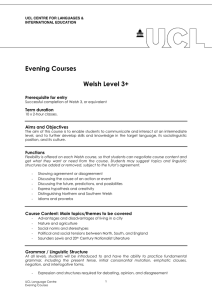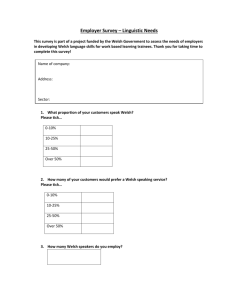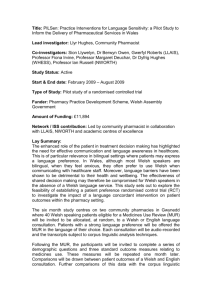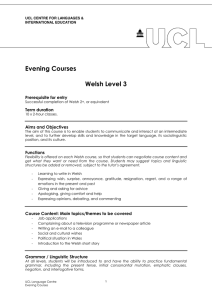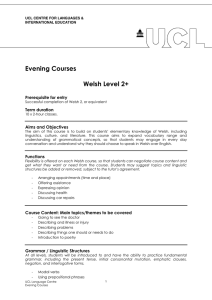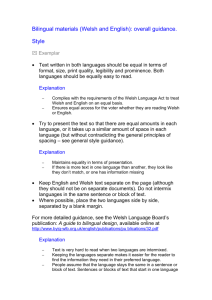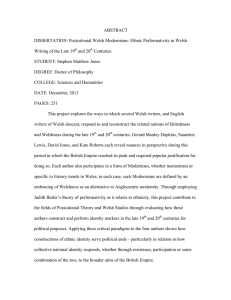Consultation Response Form
advertisement
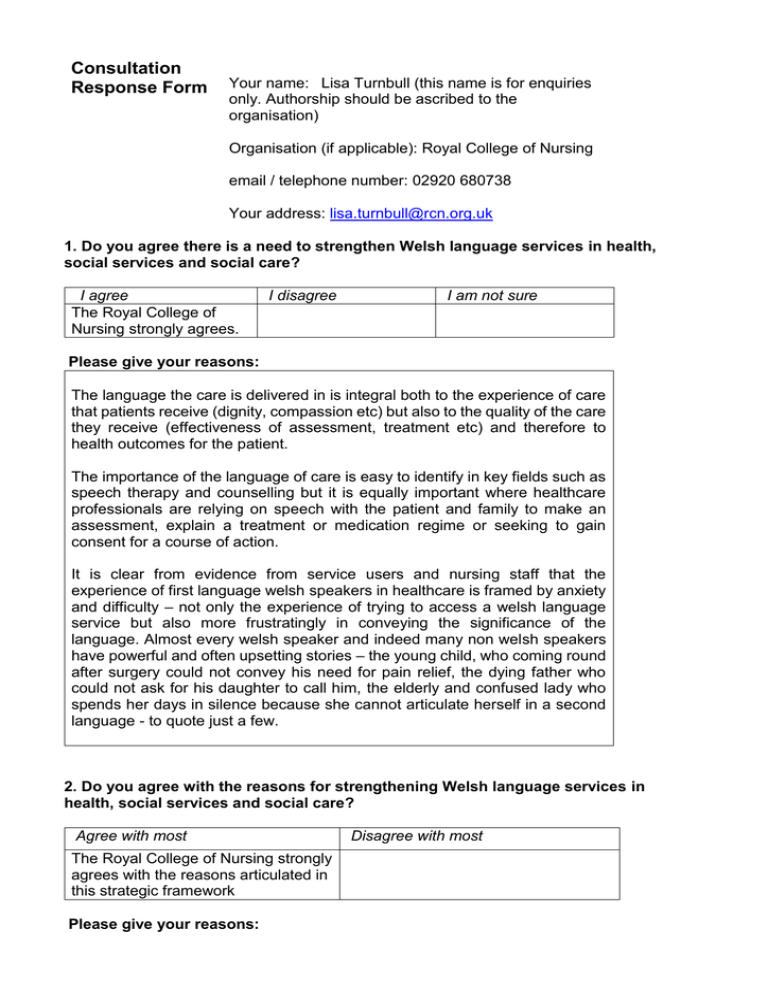
Consultation Response Form Your name: Lisa Turnbull (this name is for enquiries only. Authorship should be ascribed to the organisation) Organisation (if applicable): Royal College of Nursing email / telephone number: 02920 680738 Your address: lisa.turnbull@rcn.org.uk 1. Do you agree there is a need to strengthen Welsh language services in health, social services and social care? I agree The Royal College of Nursing strongly agrees. I disagree I am not sure Please give your reasons: The language the care is delivered in is integral both to the experience of care that patients receive (dignity, compassion etc) but also to the quality of the care they receive (effectiveness of assessment, treatment etc) and therefore to health outcomes for the patient. The importance of the language of care is easy to identify in key fields such as speech therapy and counselling but it is equally important where healthcare professionals are relying on speech with the patient and family to make an assessment, explain a treatment or medication regime or seeking to gain consent for a course of action. It is clear from evidence from service users and nursing staff that the experience of first language welsh speakers in healthcare is framed by anxiety and difficulty – not only the experience of trying to access a welsh language service but also more frustratingly in conveying the significance of the language. Almost every welsh speaker and indeed many non welsh speakers have powerful and often upsetting stories – the young child, who coming round after surgery could not convey his need for pain relief, the dying father who could not ask for his daughter to call him, the elderly and confused lady who spends her days in silence because she cannot articulate herself in a second language - to quote just a few. 2. Do you agree with the reasons for strengthening Welsh language services in health, social services and social care? Agree with most The Royal College of Nursing strongly agrees with the reasons articulated in this strategic framework Please give your reasons: Disagree with most Strengthening Welsh language services in healthcare will improve patient outcomes. It will improve the patient experience It will ensue that nursing services in Wales are at the forefront of best practice and innovative research with intentional application for our profession. 3. Do you agree that health, social services and social care organisations should be responsible for making an ‘Active Offer’ of Welsh language services to people, rather than expect service users and their families to ask for them? Yes I agree Please give your reasons No I don’t agree. Please give your reasons Yes. It is unreasonable to expect people, who by virtue of seeking a healthcare service are likely to be vulnerable, to articulate and indeed possibly argue for a particular service. The NHS should assess the likely needs of the population it services and design services (including developing the workforce) appropriately. It should advise and support staff to make and respond to the Active Offer. Healthcare professionals should be responsible for understanding what services are on offer and what arrangements can be made and being able to communicate this in a respectful manner. 4. Whilst aiming to achieve language choice for everyone, do you agree that priority in strengthening Welsh language services should be given to priority groups and their families? Yes, I agree Please give your reasons No, I don’t agree Please give your reasons Unfortunately the ‘priority groups’ do not appear to be identified in this consultation document. Who are they? Young children, people with dementia, people who have suffered a stroke, people with learning disabilities are all potential priority groups. Secondly what does ‘priority’ mean in this context? Unfortunately no definition has been provided. For example it would be very sensible to prioritise the commissioning of welsh medium education of health care professionals and the wider team for these groups. However if ‘priority’ meant translating a patient information leaflet for these groups and not doing anything for mainstream services then that would be clearly insufficient. For these two reasons the Royal College is unable at present to agree with this assertion and would welcome more information. 5. Do you agree that the actions identified in the strategic framework’s action plan will lead to better services for Welsh speakers and their families than those provided at present? Yes I agree Please give us your reasons Yes. The 7 objectives outlined are clear and comprehensive. Objective 2 on mapping and auditing and objective 3 on service planning are significant. Organisation’s must understand the linguistic skills of the workforce they employ and the needs of the areas they serve as priority. The actions under objective 5 are very significant. Education is the key to the future delivery of the service. The Welsh Government funds specific numbers of places on pre and post registration courses for nursing in the higher education sector. It would be helpful to specifically contract for Welsh language places in the same manner that subject fields are currently specified. This would encourage the development and the production of a linguistically confident and competent workforce. The actions under objective 6 are very welcome. Health care support workers provide the patient with daily nursing care. It is crucial that the recruitment process values the ability to speak welsh (whether fluent or at a ‘social’ level) and that the induction process emphasises this alongside providing a No, they will not. Please give your reasons clear message of respect for the welsh language and an understanding of the Active Offer and the responsibility this places on the care worker. The provision of continuous professional development is important not only to develop employees’ ability to speak Welsh but also linguistic sensitivity. Many people in Wales are genuinely surprised when they learn of the size of the Welsh speaking population in their own area and the age range it spans. It may also be worthwhile to provide staff on maternity leave or other breaks opportunities to develop their language skills or even make such opportunities available to those working in the independent sector. The frequent crossover of HCSWs and nurses from one sector to the other is often not recognised as an opportunity. 6. Do you broadly agree with the actions outlined in the action plan? Yes, I agree Please give us your reasons No, I do not Please give your reasons Yes. The actions are specific, measurable, achievable, relevant and bound by a time-frame. They can also be evaluated. It is imperative that Chief Executives, Nurse Directors, middle managers and ward sisters, general employees and health care support workers clear about their responsibilities under this new strategy. The Action Plan will empower people at every level to understand these responsibilities and make positive changes. 7. What else do you think should be included in the action plan? It would be useful to have a specific action around recruitment in the NHS. .Job descriptions should reflect the skill set required including whether welsh speaking is a desirable skill or an essential one. Too often an essential service is lost as a particular welsh speaking individual retires or changes jobs and the language has failed to be considered in new appointments. Very often this is because the line manager simply never considers the issue. Even at a senior level there can be myths e.g. that advertising for a welsh speaker is ‘not allowed’ It is very important that HR departments and the Equality unit work together to encourage applications from welsh speakers. Can a standard advert for a nurse be translated for example (to prevent extra cost falling on small units)? Or are NHS advertisements placed in welsh language papers and websites? 8. Are there any other related comments you would like to make? The DVD of patient stories that was produced to accompany the 2012 strategy was invaluable in starting conversations with healthcare professional, nursing staff, NHS and independent sector on the importance of the delivery of care in Welsh. The NHS Welsh language Unit has produced marvellous training resources on the Active Officer and crucially short videos highlighting how best practice can be achieved with (and often without additional resources!). We would urge the Welsh Government to produce similar material to accompany the launch of this strategy. Finally we would note the consultation document itself is printed in a very peculiar fashion with the Action Plan pages running very oddly (in the English). Bound hard copies of the final document will be important if senior level executives are to be familiar with the strategy. It should be easy to produce a version that might be considerably easier to read. Responses to consultations are likely to be made public, on the internet or in a report. If you would prefer your response to remain anonymous, please tick here:
